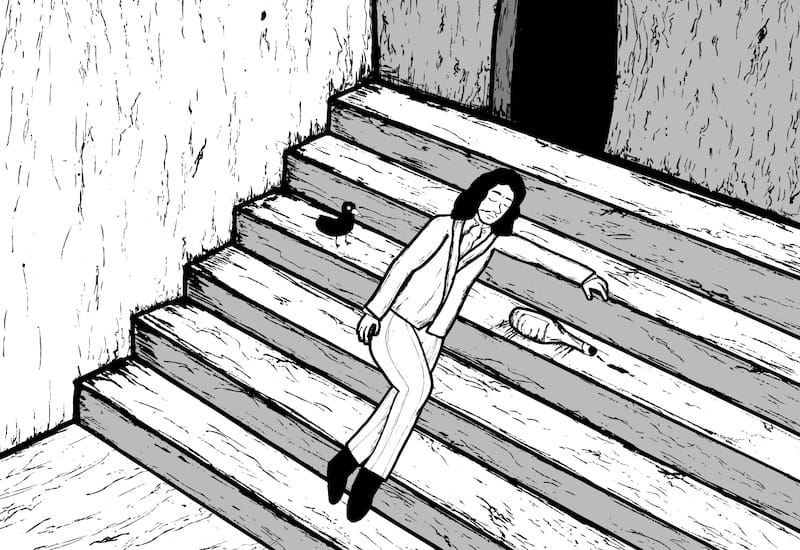Enivrez-vous
I. Introduction
There are many recordings of this poem available on YouTube. I am particularly fond of one by Serge Reggiani. (He adds two little words to the text.) I especially like Mr Reggiani reciting the poem without musical accompaniment (the recitation begins at about the 31st second of the clip):
Originally published in 1864 in le Figaro, and included as 33rd in the posthumous collection of Baudelaire’s Petits poèmes en prose, a.k.a. le Spleen de Paris (1869). Its essential notion: anything is better than living in this world in our ordinary state of consciousness, and any means of escape is justified. Alcohol, poetry, and saintliness thus serve the same end and are equally legitimate; any one of them is a kind of drunkenness.
A bit later in the 19th century Friedrich Nietzsche will, similarly, give an a-religious value to Christian asceticism as being one of the ways of rising above mere humanity. (I am of the opinion that Baudelaire preceded the post-moderns on a number of points.)
There follow: the poem, the poem glossed, and the poem translated.
For those learning how to read French: there isn’t a single word in this poem that doesn’t deserve to be in your permanent word-hoard.
II. The Poem in French
Il faut être toujours ivre. Tout est là: c’est l’unique question. Pour ne pas sentir l’horrible fardeau du Temps qui brise vos épaules et vous penche vers la terre, il faut vous enivrer sans trêve.
Mais de quoi? De vin, de poésie, ou de vertu, à votre guise. Mais enivrez-vous. Et si quelquefois, sur les marches d’un palais, sur l’herbe verte d’un fossé, dans la solitude morne de votre chambre, vous vous réveillez, l’ivresse déjà diminuée ou disparue, demandez au vent, à la vague, à l’étoile, à l’oiseau, à l’horloge, à tout ce qui fuit, à tout ce qui gémit, à tout ce qui roule, à tout ce qui chante, à tout ce qui parle, demandez quelle heure il est; et le vent, la vague, l’étoile, l’oiseau, l’horloge, vous répondront: « Il est l’heure de s’enivrer! Pour n’être pas les esclaves martyrisés du Temps, enivrez-vous; enivrez-vous sans cesse! De vin, de poésie ou de vertu, à votre guise. »

III. The Poem Glossed
Il faut être toujours ivre. Tout est là: c’est l’unique question. Pour ne pas sentir l’horrible fardeau du Temps qui brise vos épaules et vous penche vers la terre, il faut vous enivrer sans trêve.
Il faut – Falloir is always used impersonally, that is with a place-holder il as its apparent 3rd-person singular subject, meaning “It is necessary,” but with an implied personal subject (either generic, or more specific depending on the context). See translation below.
unique – False friend alert (†††)! See the Language File Demi-Faux-Amis: unique.
vous enivrer – If you need refreshing about verbs like s’enivrer, check out the Language file Four Meanings of Pronominal Verbs. This verb (“to get drunk”) is one of a number of pronominal verbs equivalent to our “get” verbal phrases: “to get up” (se lever), “to get dressed” (s’habiller), “to get married” (se marier), “to get angry” (se fâcher), etc.
(The en- of enivrer retains its full nasal character: [ɑ̃nivre].)
While learning s’enivrer, you might as well also learn the adjective ivre (drunk, < Latin ebrius), and the feminine noun ivresse, meaning “alcoholic intoxication,” but also, metaphorically, any state of exaltation (perhaps because ancient writers on mysticism were wont to refer to mystical experience as a sobria ebrietas = une sobre ivresse = “a sober drunkenness”1)
Mais de quoi? De vin, de poésie, ou de vertu, à votre guise. Mais enivrez-vous.
de – This little preposition has many meanings in addition to basic “of” and “from,” particularly when it is used in tandem with a verb, as it is here: s’enivrer de…. Compare:
♬ « Les moutons vivent d’herbe, les papillons de fleurs. » ♫ (Sheep live on grass, butterflies live on flowers.)
guise – To help you remember the meaning of this word, know that a small number of French nouns beginning with gu correspond to English words beginning with “w-.” E.g., la guerre = “war,” une guépe = “wasp,” and une guise = a “wise” in the sense of “fashion, manner” (as in “likewise”). An expression popular in formal prose is: En guise de…, as in:
En guise de conclusion = “By way of conclusion,…”
enivrez-vous – See (if you need to) the French Language topic Imperative Mood of Pronominal Verbs.
Et si quelquefois, sur les marches d’un palais, sur l’herbe verte d’un fossé, dans la solitude morne de votre chambre, vous vous réveillez, l’ivresse déjà diminuée ou disparue, demandez au vent, à la vague, à l’étoile, à l’oiseau, à l’horloge, à tout ce qui fuit, à tout ce qui gémit, à tout ce qui roule, à tout ce qui chante, à tout ce qui parle,…
l’ivresse déjà diminuée ou disparue – This is a construction I call an “absolute participial phrase” (on the model of the Latin construction called the ablative absolute). It involves a noun and a past participle, the noun being most often, in French, a part of the body introduced by the definite article. Implied, in between the noun and the past participle, is a form of the “to be,” étant or ayant été (“being” or “having been”).
« Je marcherai les yeux fixés sur mes pensées, … le dos courbé, les mains croisées »–Victor Hugo, “Demain, dès l’aube”
The emboldened words can be translated literally as “the eyes fixed…the back bent, the hands crossed2.” One could then supply the missing form of the verb “to be” (“the eyes being fixed,” etc.). But it is better to do the following: 1) stick the preposition “with” at the beginning and 2) substitute a possessive adjective (determined by the context) for the definite article:
“I will walk with my eyes fixed on my thoughts, … with my back bent, with my hands crossed“
For translation of l’ivresse déjà diminuée ou disparue, see Part IV below.
demandez au… – In French you place a request for a thing or a piece of information to a person (but you don’t translate it that way in English). This series beginning with (demandez) au vent,… may help you to remember that construction.
tout ce qui – “all that which” = “all that.” On the forms ce qui and ce que, see the French Language topic Indefinite Relative Pronouns.
…demandez quelle heure il est; et le vent, la vague, l’étoile, l’oiseau, l’horloge, vous répondront: “Il est l’heure de s’enivrer! Pour n’être pas les esclaves martyrisés du Temps, enivrez-vous; enivrez-vous sans cesse! De vin, de poésie ou de vertu, à votre guise.
demandez quelle heure il est – In French as in English, when a question is made indirect, you undo the inversion of subject and verb:
Direct Question. Quelle heure est-il? (What time is it?)
Indirect Question. Demandez quelle heure il est. (Ask what time it is.)
demandez quelle heure il est… Il est l’heure de s’enivrer – As I also say in another place, there are three words in French corresponding to different uses of English “time”: le temps (ordinary time of duration), la fois (a time = a repetition), and l’heure f. (time of the clock [“the hour”]). In translation, English idiom is such that “ask what time it is” gets the idea across in the first case, but the later “It is time to get drunk” is ambiguous, since “it is time to” in English can imply “it is high time,” whereas in fact the meaning of il est l’heure de is “it is the time of the clock when we do such-and-such.” See the translation below.
IV. The Poem Translated
| Il faut être toujours ivre. Tout est là: c’est l’unique question. Pour ne pas sentir l’horrible fardeau du Temps qui brise vos épaules et vous penche vers la terre, il faut vous enivrer sans trêve. | One must always be drunk.3 Everything lies therein4: it’s the only question. So as not to feel the horrible burden of Time that breaks your back5 and bends you earthward, you must ceaselessly get drunk. |
| Mais de quoi? De vin, de poésie, ou de vertu, à votre guise. Mais enivrez-vous. Et si quelquefois, sur les marches d’un palais, sur l’herbe verte d’un fossé, dans la solitude morne de votre chambre, vous vous réveillez, l’ivresse déjà diminuée ou disparue, demandez au vent, à la vague, à l’étoile, à l’oiseau, à l’horloge, à tout ce qui fuit, à tout ce qui gémit, à tout ce qui roule, à tout ce qui chante, à tout ce qui parle, demandez quelle heure il est; et le vent, la vague, l’étoile, l’oiseau, l’horloge, vous répondront: « Il est l’heure de s’enivrer! Pour n’être pas les esclaves martyrisés du Temps, enivrez-vous; enivrez-vous sans cesse! De vin, de poésie ou de vertu, à votre guise. » | But on what? On wine, on poetry, or on virtue, just as you like.6 But get drunk. And if, sometimes, on the steps of a mansion, on the green grass of a ditch, in the bleak loneliness of your bedroom, you wake up, with your drunkenness already diminished or disappeared, ask the wind, the wave, the star, the bird, the clock, everything that flees, everything that moans, everything that rolls, everything that sings, everything that speaks, ask what time it is; and the wind, the wave, the star, the bird, the clock will answer you: “It is the time for getting drunk! So as not to be the tortured slaves of Time, get drunk; get drunk without ceasing! On wine, on poetry, or on virtue, just as you like.” |
- Hans Lewy (†1945, not the mathematician †1988) wrote a whole book on the subject published in 1929. See this page of reviews. A musical piece “Sobra ebrietas” throws no light on it, as far as I can tell. There seems also to be a musician or musical group who has taken sobria ebrietas as a name.[↩]
- I.e., behind the speaker’s back.[↩]
- More closely, “It is necessary always to be drunk.”[↩]
- Literally: “Everything is there.”[↩]
- Literally: “breaks your shoulders.”[↩]
- That is, “according to your fashion (= the fashion that you like).”[↩]


Leave a Comment